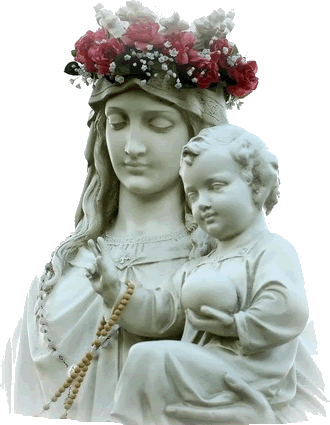Now that I'm an adult I understand that the badness of people adhering to communist ideology is not so clear cut. Many well-intentioned but foolish or gullible people have believed in communism. However, the wickedness of communist ideology itself is beyond doubt. Any creed that views man as merely a physical creature, without a spiritual dimension, who is shaped and driven solely by materialistic forces is a lie. It can ultimately only bring much misery. Communism is an inhuman, anti-Christian philosophy and its consequences have been catastrophic.
But what is May Day and what does it have to do with communism?
May Day actually has pagan roots. May 1st was celebrated as the first day of summer in pre-Christian Europe. Such activities as bonfires, dancing, Maypole decorating and the election of May Queens took place.
 |
| Maypole dancing |
As Christianity spread through Europe, many pagan customs were 'baptized,' so to speak; they were Christianized and came to express some aspect of Christian belief. Christmas, with many of its attendant customs, is a prime example of this. In Roman Catholic tradition, May is observed as Mary's month and so May 1st is a celebration of the Blessed Virgin Mary. The custom of electing a May Queen who is adorned with flowers has become the custom of adorning statues of Mary with flowers.
The socialist / communist connection comes at the end of the 19th century. On May 4th, 1886 in Chicago, a rally in support of workers striking for an 8-hour workday turned violent. Somebody threw dynamite at the police, who responded by shooting into the crowd, killing dozens. This became known as the Haymarket Square Massacre. An international meeting of socialists in Paris in 1889 called for international protests on the anniversary of the massacre in 1890. Eventually, May 1st was adopted as International Workers' Day, or Labor Day as it's typically known around the world.
President Grover Cleveland didn't want the United States to celebrate Labor Day on May 1st as he was afraid it would become a perennial occasion to commemorate (probably violently) the Haymarket Massacre. That is partly why America celebrates Labor Day the first Monday in September.
May 1st has traditionally been commemorated with military parades in communist countries like the Soviet Union, Cuba, China and North Korea. It's a national holiday in many other countries and is often marked by demonstrations or riots where property is attacked and burned.
It's a national holiday in Poland and with another national holiday on May 3rd, Constitution Day, it makes for a nice long weekend.
The Catholic Church in her wisdom has also attempted to Christianize Labor Day. In 1955 this day was dedicated to Saint Joseph the Worker. Saint Joseph was a carpenter and is the patron saint of workers and craftsmen.


No comments:
Post a Comment